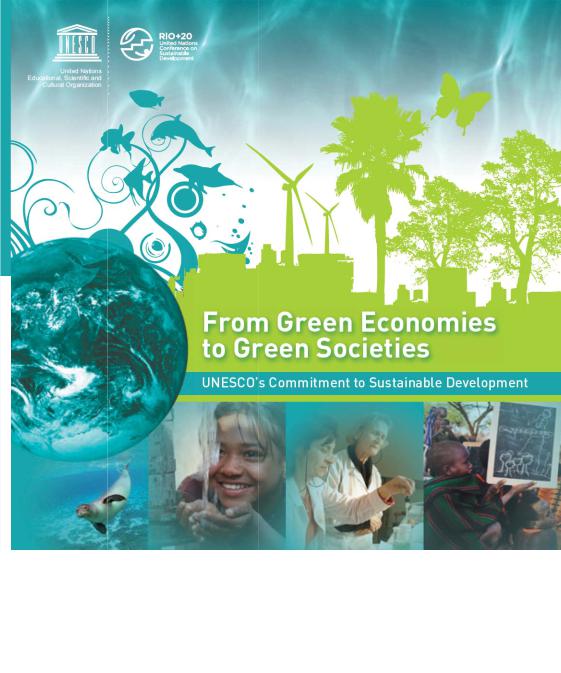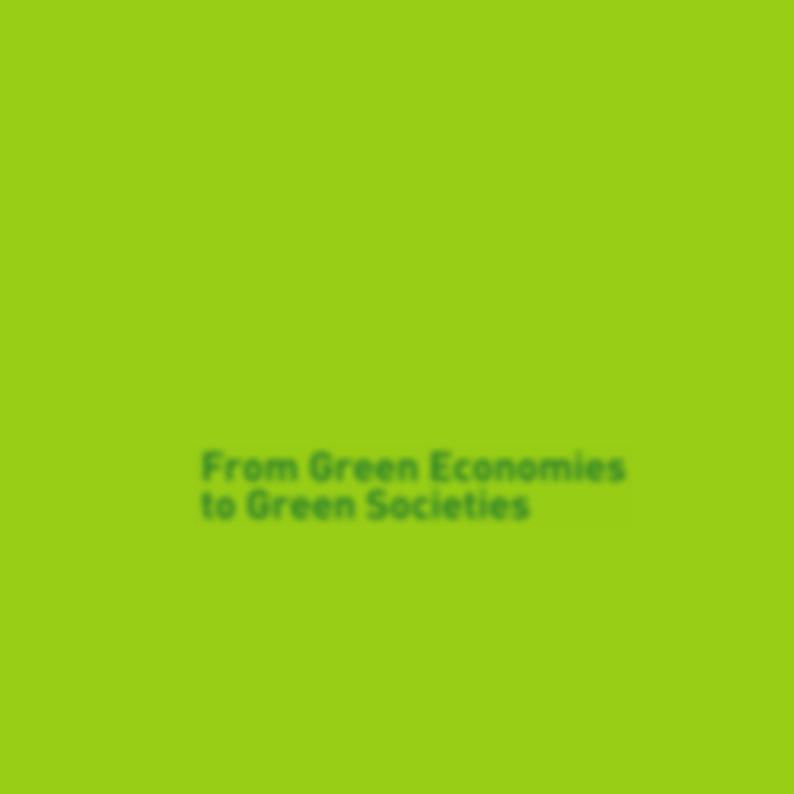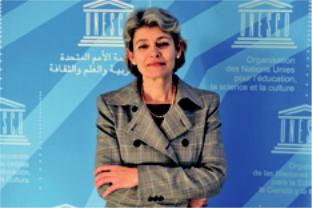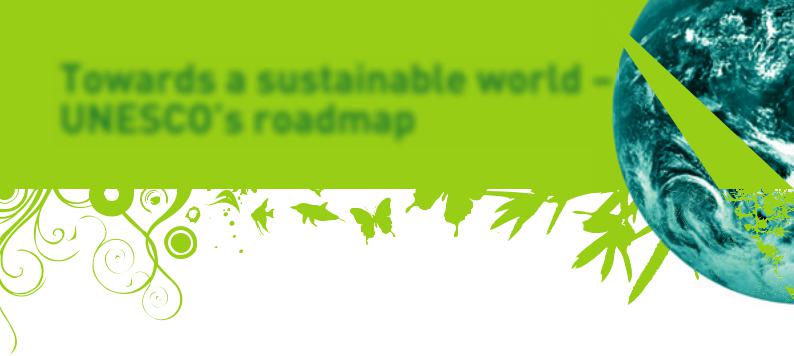
От зеленой экономики к зеленому обществу
.pdf

An Opportunity not to be missed: The UN Conference on Sustainable Development (Rio+20), Rio de Janeiro, Brazil, 4-6 June 2012
Rio+20 offers the world a unique chance to advance the sustainable development agenda. The conference has three main objectives: to secure renewed political commitment to sustainable development, to assess progress and gaps in implementation of agreed commitments, and to address new and emerging challenges. The two themes of the Conference are a green economy within the context of sustainable development and poverty eradication, and the institutional framework for sustainable development.
Acknowledgements
This brochure was an Organization-wide effort. It was possible thanks to the valuable contributions of UNESCO staff at Headquarters and in the field.
It was prepared under the direction of Hans d’Orville, Assistant Director-General for Strategic Planning with guidance from Jean-Yves Le Saux,
Director, Division of PMR and Deputy Director of BSP
by a dedicated BSP team composed of Clare Stark, Iulia Nechifor and Matthias Eck.
Download a copy from: http://www.unesco.org/new/en/bureau-of-strategic- planning/themes/special-programme-issues/rio-20/
Request a copy from UNESCO: c.stark@unesco.org, i.nechifor@unesco.org, m.eck@unesco.org
Or write to: Bureau of Strategic Planning, UNESCO, 7 place de Fontenoy 75352 Paris 07 SP France
Printed by ADM/CLD on certifi ed paper supporting responsible use of forest resources.
ADM/CLD awarded eco-friendly printer label in 2010.
© UNESCO 2011
Printed in France
BSP-2011/WS/4
CLD 2861.11
Cover left to right: © NASA; © UNESCO/James Watt - Seapics; © IUPAC; © Niamh Burke; © Mark Hofer

From Green Economies to Green Societies
UNESCO’s Commitment to Sustainable Development
1
Contents
Foreword |
4 |
|
|
|
|
|
|
Towards a sustainable world – UNESCO’s roadmap |
7 |
|
|
|
|||
Educating for a sustainable future |
13 |
|
|
|
|
|
|
Mobilizing science for green transformations |
23 |
|
|
|
|
||
A green future must be blue: the role of oceans and freshwater |
37 |
|
|||||
Conserving biodiversity for life |
47 |
|
|
|
|
|
|
Mitigating and coping with climate change |
51 |
|
|
|
|
||
Supporting disaster preparedness and countries in post-crisis situations |
59 |
||||||
Culture: a driver for effective sustainable development |
65 |
|
|
|
|||
UNESCO sites: living laboratories for sustainable development |
|
71 |
|
||||
The media – building awareness for green policy priorities |
77 |
|
|
||||
UNESCO’s commitment to sustainable development |
79 |
|
|
|
|||
3

Foreword
■ Rio+20 must succeed
Wemustnotmisstheopportunityofthe2012UNConference on Sustainable Development to set a new agenda for a sustainable 21st century. In Rio, we must see where we stand, cast a cold eye on our successes and failures and draw a new roadmap for the future.
We are not starting from scratch. The principles we crafted in Agenda 21 at the Earth Summit twenty years ago in Rio remain salient. The context has changed. New challenges have emerged, along with new risks. These include increasing social disparities and inequity, population growth, climate change, the deterioration and pollution of the environment, the unsustainable use of freshwater and depletion of ocean resources, as well as increasing cases of natural and human-made disasters.
Thepoorest,mostmarginalisedandvulnerablecommunities are hit hardest. They also suffer the most from a global crisis that has fi nancial, energy, food and environmental dimensions. All of this has thrown into doubt the viability of current models of development.
■ We need a new way forward
We need an approach to development that starts with individual dignity, that is centred on human growth, and that provides convincing answers to the complex social, economic and environmental questions we face. We need new indicators to guide us and new measurements of progress. Sustainable growth must be inclusive, it must be socially equitable, and it must protect our ecosystems and climate. The mantra of ‘grow today, clean up later’ can no longer stand – for developed or developing countries. The time when we could put off difficult choices is over. There are no more shortcuts.
We must build inclusive, green societies and economies by investing in human development and social capital. New challenges require innovative solutions, which must harness also indigenous knowledge for sustainable development. These will be born from new ways of thinking and attitudes by people of all ages and from all walks of life. No society can afford to leave anyone aside. Green societies must allow women and men to contribute equally in leading and building a more sustainable future. We need a change of culture to tackle climate change.
UNESCO will bring to Rio+20 a vision for sustainable development that makes the most of the transformative power of education, the sciences, culture and media.
4
■ Education is our fi rst motor
Education is one of the best weapons to fi ght poverty and inequality. Each year of additional schooling increases individual earnings by 10 percent. Fundamentally, education is about values. It crafts new ways to understand the world and to act. Education for Sustainable Development must foster the attitudes and behaviours necessary for a new culture of sustainability. It must be the channel for developing and transmitting new skills and knowledge. Technical and vocational education and training must provide the competences and tools necessary for green economies.
■ Science must drive the green transition
Science holds many of the answers to the complex questions we face. For this, science must be mobilized. We must help countries build capacity, develop national policies in science, technology and engineering, and create international networks. Green skills and technologies must be shared and transferred. Renewable energy is fundamental. Challenges today cut across the traditional boundaries of disciplines and stretch across the lifecycle of innovation -- from research to knowledge development and its application. Science, technology and innovation must drive our pursuit of more equitable and sustainable development.
■ Culture is an accelerator
New approaches to sustainable development will be effective only if they match the context. Culture must be built into development from the start -- not bolted on as an afterthought. The ultimate renewable energy, culture
is also a source of innovation. In 2009, culture generated jobs and income to a value of USD $1.3 trillion. Cultural industries are growing -- but they need support to become more powerful levers for economic development, social cohesion, and environmental protection. This calls also for recognizing and making more of traditional knowledge systems and practices.
■The green transition will need an information revolution
Green transformation will rely greatly on the role of the media to enable well-informed policy choices. For this, we must build the capacity of media professionals to investigate and report on issues related to sustainable development. We must support free, independent and pluralistic media to raise public awareness and to build solidarity.
■ A green future must be blue
Ouroceananditsresourcesare deterioratinganddepleting. Ouroceanmakestheearthhabitableforpeople.Withmarine and coastal resources and industries representing more than 5% of global GDP, our ocean also provides significant social and economic benefi ts and plays an important role in poverty alleviation. To mitigate the rapid degradation of our ocean, Rio+20 must lay out a new vision for the governance of our ocean.
About 80 percent of the world’s population lives today in areas lacking water security. By 2025, an estimated 60 percent of the world’s population will live in water-stressed conditions,andasimilarproportionwillbewithoutadequate sanitation. Rio +20 must provide new momentum to manage better the world’s freshwater resources.
5

Nature must be nurtured, and biodiversity must be safeguarded. The demand for resources worldwide exceeds today the biological capacity of the Earth by an estimated 20 percent. We must conserve and use sustainably the earth’s biodiversity and ecosystem services. This calls for sharper policy and better cooperation at the national and regional policies.
Rio+20 must be remembered as a turning point – the beginning of a global green transition. This is UNESCO’s vision, and this guides all of our work to harness the
power of education, the sciences, culture, information and
communication for a more sustainable future.
These are the stakes for Rio+20.
Irina Bokova
6

Towards a sustainable world – UNESCO’s roadmap
© NASA
The UN Conference on Sustainable Development (Rio+20), to be held in Rio de Janeiro, Brazil, from 4-6 June 2012, offers an extraordinary and unique
opportunity to reset the world on a sustainable development path.
Despite substantial improvements over the past 20 years in many key areas of sustainable development, the world is not on track to achieve the goals as aspired to in Agenda 21, adopted in Rio de Janeiro in 1992, and reiterated in subsequent world conferences, such as the World Summit on Sustainable Development held in Johannesburg in 2002. While there have been some achievements in implementing Agenda 21, including the implementation of the chapters on “Science for Sustainable Development” and on “Promoting Education, Public Awareness & Training”, for which UNESCO was designated as the lead agency, much still remains to be done.
Increasing disparities, inequalities and social inequity, growing deterioration of the environment and resources, as well as concurrent energy, food and financial crises, reflect the inadequacy of the world’s current development paradigm. No development model which leaves a billion people in hunger, poverty and socially excluded will be sustainable.
Rio+20 must underpin a broader, longer-term process of redressing imbalances, a rethinking of priorities, and the necessary institutional reforms to bring about coherence in economic, environmental and social policies, which benefits all members of society.
Chartingthewayforwardinasustainablemannermuststart by recognizing that the world has changed in fundamental ways, with shifts in demographic growth, resource consumption, production patterns, climate change, and increassing natural and human-induced disasters. There has been much technological progress, from renewable
7
energy to new vehicles for social dialogue, such as social media. Achievements have been made in attaining a number of the Millenum Development Goals (MDGs) and Education for All (EFA) goals. All of this has profound implications for UNESCO and its activities.
■Building equitable, inclusive, green societies
Clearly we need to break with ‘business as usual’. Green economies are an important means to achieve what sustainable development ultimately aims at: the wellbeing of people while respecting the environement. Green economies alone are not enough. The complex and multifaceted challenges and risks of today and the future call for a response which addresses the social, economic and environmental issues facing the world today in an integrated and comprehensive manner, with new indicators to guide us. It calls for building green societies. Green societies must be fair, equitable and inclusive societies. They must foster innovative and creative solutions to today’s global challenges. These will be born from new ways of thinking and attitudes by people of all ages and from all walks of life. No society can afford to leave anyone aside. Particular attention must be given to the needs of Africa. Equally, emphasis must be given to the empowerment of women, youth, and indigenous people in order to ensure inclusive participation in decision-making processes and their important contribution towards achieving sustainable development. The empowerment of marginalized groups mustbebasedontherespectofhumanrightsandsupported by scaling up investment in human capital.
Since the adoption of Agenda 21, sustainable development has remained elusive for many African countries. Poverty remains a major challenge and most countries have not benefited fully from the opportunities of globalization, further exacerbating the continent’s marginalization.
To develop inclusive, green societies, greater support is needed to assist African efforts for peace, democracy, good governance, respect for human rights and fundamental freedoms, including the right to development and gender equality. Developing human and institutional capacitybuilding at the regional, subregional and national levels, consistent with national policies, programmes and nationally-owned and led strategies for poverty reduction and sustainable development will be critical to this endeavor. Support is also needed in developing and implementing science, technology and innovation policies for sustainable development; developing related research and development capacities; developing and implementing holistic education policies and programmes to achieve the EFA and MDG goals; and leveraging the power of culture and communication and information for sustainable development.
Women make up a majority of the world’s poor and adult illiterates. When they are marginalized in all policy and decision-making processes at national, regional and global levels, when half of humanity is left on the margins, it is impossible to tap into the full potential of humankind to address issues of sustainable development which concern us all. A key instrument to change this situation is to invest in women’s and girls’ education to lift them out of poverty and to give them equal opportunities to engage in all development processes as full and active citizens.
■Education – the foundation for green societies
Green societies are educated societies in all of its dimensions. Investing in education is crucial for achieving sustainable development, poverty eradication, equity and inclusiveness. Education holds the key to productivity and sustainable growth, improves health and nutrition, income, and livelihoods, creating a condition for achieving all of the
8
MDGs and the EFA goals. No country has ever climbed the human development ladder without steady investment in education.
A second critical factor is the quality of education. Years of schooling alone do not guarantee that students will receive an education relevant for their lives and careers. Quality – that is the content of the education provided, the excellence of teachers, actual attainments and achievements – matters as much as quantity. There is a positive feedback loop between education and innovation as a prime mover of sustainable growth in green economies, where innovation, green skills and the capacity to cope with change will be significant drivers of each economic sector. Education is a sound investment; quality education is a smart investment for building inclusive, green societies.
■ Educating for a sustainable future
Education for Sustainable Development (ESD) is a particularly important dimension of quality education. It provides people at all levels of education, but in particular youth, with the skills, competencies and knowledge needed to impart values indispensable for behavior and practices conducive to sustainable development, and for multicultural and multi-ethnic societies aspiring to democratic citizenship. It is fundamental for preparing young people for green jobs, for adapting to a changing physical environment, and for changing unsustainable consumption and production patterns. ESD must be strengthened and promoted at all levels and in all educational settings throughout life. This calls for mainstreaming education for sustainable development comprehensively into relevant national education policies and practices. It equally calls for developing effective mechanisms to link green growth labour market objectives to educational programmes, particularly through technical and vocational education and training. It entails reforming formal, informal and non-
formal education systems so as to prepare young men and women for a green labour market and to retrain the existing workforce.
■Mobilizing science for green transformations
To develop innovative, green solutions to address the climate, food and energy crises facing the world today, science, technology, research and development capacities for sustainable development must be strengthened. An estimated 2.5 million engineers and technicians will be needed in sub-Saharan Africa alone to achieve improved access to clean water and sanitation. This demonstrates the need to strengthen science education, stem brain drain, and encourage more young men and women to go into scientific disciplines. Open Access to scientific information is a prerequisite for generating knowledge for sustainable development. Scientifi c evidence and ethical principles should inform behaviours, policy action and governance decisions to strengthen sustainable development agendas. Climate science must be a key factor in designing informed policy responses to mitigate and adapt to climate change and for disaster preparedness and resilience.
■A green future must be blue: the role of oceans and freshwater
Our ocean provides signifi cant social and economic benefits and plays an important role in poverty alleviation, and is at the core of global systems that make earth habitable for people. To mitigate the rapid degradation of the ocean, there is a need for integrated scientific, evidence-based policy-making that cuts across several domains in order to connect the environmental, social and economic aspects of ocean governance.
Securing access to safe drinking water (MDG 7) for all and wisely managing this resource is a high priority on the
9
